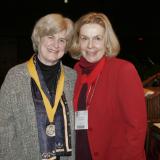2004 Gruber Genetics Prize
In addition to locating a gene linked to predisposition to breast cancer, Professor Mary-Claire King pioneered the human rights application of DNA testing to identify the orphaned children of Argentine political dissidents.
2004 Genetics Prize Recipient
Laureate Profile
Mary-Claire King is responsible for three major findings in modern genetics that span the fields of molecular evolutionary biology, genetic epidemiology and cancer biology, and forensic biology:
- demonstrating the close similarity of the human and chimpanzee genomes;
- discovering a gene (BRCA1) that predisposes to breast cancer;
- introducing a robust means for identifying people (or their remains) by comparing their DNA to that of relatives.
Her laboratory at the University of Washington focuses on the identification and characterization of genes responsible for complex, common human conditions.
Dr King's mapping of a gene that predisposes to breast cancer led to the discovery that mutations in this single gene, BRCA1, cause breast cancer in many high-risk families. The discovery permanently changed thinking about the genetics of common diseases and has been successfully emulated by researchers studying many other serious diseases including Alzheimer's, Parkinson's, and prostate cancer.
Dr King also has a long involvement in promoting the human rights applications of genetics. As a young scientist she was a teacher and researcher in Chile. Her experiences in South America inspired her ongoing project to assist the "Abuelas," the grandmothers of the children of those killed during Argentina's "dirty war" in the 1970s and early 1980s. These parents of "the Disappeared" seek to be reunited with the children of their lost sons and daughters, and a genetic test that matches maternally inherited mitochondrial DNA sequences is often the only way to confirm that link. In addition, Dr King oversees a collaboration between Israeli and Palestinian scientists to identify genes for deafness.
"Genetics passes on to us important information about our inheritance," said Peter Gruber, chairman of the Peter Gruber Foundation. "We are extremely pleased to honor the work of Dr Mary-Claire King. She is an innovative researcher and a powerful advocate for the synergy of science and social action."
Citation
The Genetics Prize of The Peter Gruber Foundation is hereby proudly presented to Professor Mary-Claire King, University of Washington.
By genetically locating a gene predisposing to breast cancer, King established a new paradigm for analyzing genetic contributions to common human diseases. She pioneered the use of DNA testing in human rights by identifying the orphaned children of political dissidents killed during the dark days of Argentinean dictatorship. Her intellectual contributions and her personal courage are models for how both the theory and methods of genetics may be applied to benefit humanity.































